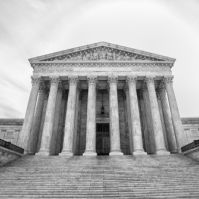
A 34-foot cross on public lands in Pensacola, Florida is a “neutral symbol” with no Christian connotation, according to a three-judge panel.
And with that, the famous Bayview Park Cross, built before World War II as a place for the community to gather, will live to stand another day.
It was all the way back in 2016 when four plaintiffs supported by the American Humanist Association and the Freedom From Religion Foundation first sued the city, arguing the 34-foot cross represented a blatant breach of the U.S. Constitution’s separation of church and state and should, therefore, be torn down.
The ensuing two-year court battle seemed to back that view, until a 7-2 Supreme Court ruling on Maryland's own century-old Bladensburg Peace Cross in 2019, determined by the nation’s highest court to be more war memorial than Christian symbol, forced the 11th Circuit Court of Appeals to revise its own ruling. It has since been determined that while the plaintiffs are right to challenge Pensacola’s “maintenance” of the cross, “the cross’s presence on city property does not violate the Establishment Clause.” As the three-judge panel that reversed the original decision said, “the cross’s message has evolved into a neutral one as it has become embedded in the fabric of the Pensacola community by hosting a variety of gatherings and events, both religious and secular.”
While the ultimate faith of the Bayview Cross is far from settled, its defenders have deemed this a win for both religious and historical preservation.
Town Officials Cheer
“The Supreme Court has now made clear that religious symbols are an important part of our nation’s history and culture,” said Luke Goodrich, senior counsel at Becket. “Religious symbols aren’t like graffiti that the government has to erase as soon as someone complains.”
Former Pensacola Mayor Ashton Hayward insisted that Pensacola welcomes all, but that the Bayview Cross should stay. “Pensacola is a diverse city that welcomes people of all faiths and none,” he said. “The cross is a valuable part of our history; Tearing it down would needlessly signal hostility towards religion.”
Current Pensacola mayor Grover C. Robinson IV agreed: "citizens of Pensacola will celebrate our long-awaited victory and the preservation of the Bayview Cross.”
Atheist Groups Less Happy
The FFRF is far less thrilled with continued religious creep in modern secular society.
“It is not ‘hostile to religion’ to uphold government neutrality over religion. Bayview Park is not a Christian park, Pensacola is not a Christian city and the United States is not a Christian nation,” wrote Co-President Annie Laurie Gaylor in a statement released by the foundation. “Tax-exempt church property abounds where this cross belongs. Its presence in a city park sends a message that Christian citizens are insiders, and the rest of us are outsiders — and that’s an alarming message.”
Cross Monuments Likely to Stay
With the precedent set in the Bladensburg Peace Cross case, it seems clear that groups like the Freedom From Religion Foundation are going to have a tougher time getting massive Christian monuments taken down.
The court’s arguments seem to be in part that the longer these crosses have been around, the more embedded they become in the fabric of the community. Yet in many cases, they were erected in a time when groups like FFRF didn’t exist to protest them in the first place.
So as another Christian monument is allowed to stand, it's important to ask who truly gets hurt in the process. It’s hard to imagine many Jews, Muslims, Buddhists, Satanists, atheists, or any other non-Christians passing by the park being truly incensed at a cross that has existed there longer than they've been alive.
On the other hand, is there an expiration on unconstitutional actions? If it was unconstitutional at one point, shouldn’t it still be today?
What do you think? Does this ruling erode the wall between church and state, or does the cross’s long-standing tenure in the park make it acceptable?



